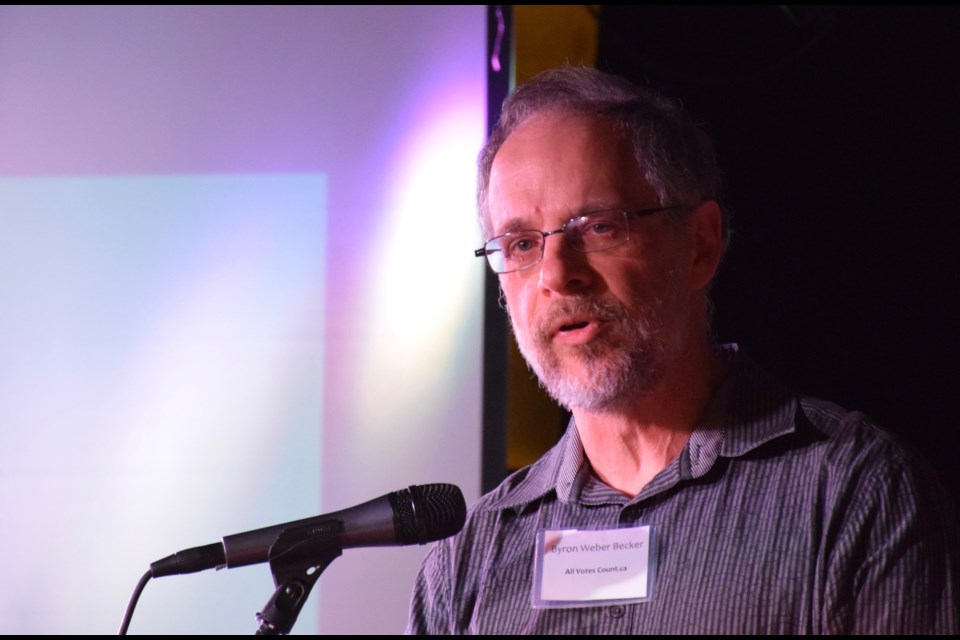Call it the Guelph Model.
Contrary to election promises, an overhaul of Canada’s electoral system is no longer part of the federal government’s mandate…for now. But while the idea has stalled in Ottawa, that is not stopping many collaborators in Guelph from pursuing a model of proportional representation aimed at spurring a governmental change of heart.
A coalition of local champions of electoral reform has been working throughout February to come up with a workable model. On Thursday night, supporters of a different kind of system packed into the eBar on Quebec Street for the unveiling of a made-in-Guelph version of what is called local proportional representation.
The model, presented by University of Waterloo’s Byron Weber Becker, borrows from other examples of proportional representation, of which there are many.
But it has the unique feature of clustering together a number of connected ridings, giving voters much more flexibility and choice in how and where they cast their votes.
“We think this can meet the needs of the moment and help drive the reform process forward,” Weber Becker said.
Local proportional representation is a system that is ready to be presented to parliament for consideration, he added. It is a system that ensures local representation, sincere voting, accountability, diversity among parliamentarians, and governments that are more collaborative in nature.
Like any nonconventional idea, the mechanism of the model has some confounding elements. But essentially it allows a voter to make up to five choices, on a scale from 1 to 5, on a ballet that includes all candidates in a cluster of ridings.
How the selections are distributed is up to the voter. They can choose to make just one selection, or spread their five choices across several ridings based on party loyalty, or confine all their selections to just one riding.
As a candidate accumulates the vote total needed to be elected, based on a mathematical formula related to the number of total votes cast relative to the number of candidates. That winning candidate’s excess votes are then equitably distributed to other candidates. This process continues until all winners are determined.
Weber Becker explained that if your highest ranked candidate is eliminated, your ballot goes to the next highest ranked candidate still in the race. And if your highest ranked candidate has more votes than needed to win, your ballot goes to your next highest ranked candidate at a reduced value.
Liberal leader Justin Trudeau promised electoral reform during the 2015 federal election, declaring that if he became prime minister the 2015 vote would be the last under a first-past-the-post system. As of early February that plan was no longer part of the mandate of Minister of Democratic Institutions Karina Gould.
Much work apparently went into the exploration of electoral reform on the part of the government, but no clear preference for an alternative system presented itself, and no consensus emerged. Without broad-based support for reform to the system, the government reneged on the idea.
Many across the country, and a growing number of people in Guelph, see the rescinding of reform as a betrayal. A number of rallies have been held locally, and a multi-party/non-partisan coalition has been working behind the scenes locally to craft a model believed to have the potential for broad-based support.
A number of people addressed Thursday night’s gathering, all under the banner of Democracy Guelph. Rev. Anne Gajerski-Cauley said Canada has been flirting with the idea of electoral reform for 100 years. It is time to make a commitment, she said.
The new model of local proportional representation, she said, gets the country on the road to reform, and would result in representation that more accurately reflects the demographics and diversity of the country.
Mike Schreiner, leader of the Green Party of Ontario, agreed that the local proportional representation model would result in a greater diversity of voices and people in Ottawa.
“We want to put partisan interests aside and put democracy first,” he said, speaking of the local effort to bring about reform.
Sara Sayyed said that as a Muslim, a mother, and a person with relatives living in United States, she is appalled by a level of “rhetoric and ugliness I never expected to see in my lifetime.” The US election, she said, is clear evidence of how quickly and surprisingly a vote can turn in a very disturbing direction.
It is easy to become complacent following an election, she said, but it is very important and reassuring to see a coalition like Democracy Guelph fighting for change.
Guelph MP Lloyd Longfield attended Thursday night’s meeting. He said many MPs were disappointed that dialogue on the issue of electoral reform was stalled. But many are happy by what is happening in Guelph around the issue. He vowed to continue to listen and engage in dialogue.
